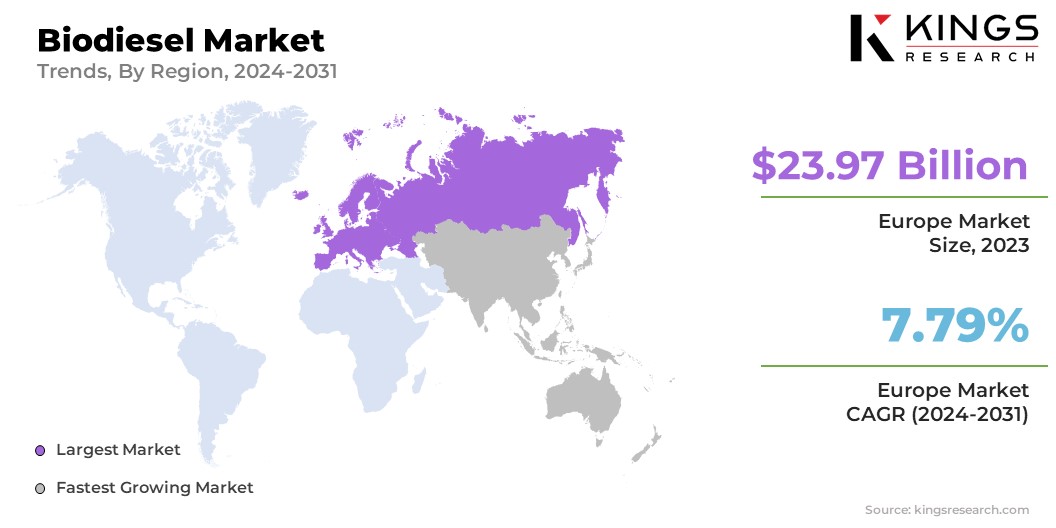Energy and Power

Biodiesel Market

Biodiesel Market Size, Share, Growth & Industry Analysis, By Source (Vegetable Oil, Animal Fats), By Application (Fuel, Power Generation, Others) and Regional Analysis, 2024-2031
Pages : 120
Base Year : 2023
Release : April 2024
Report ID: KR658
Biodiesel Market Size
The global Biodiesel Market size was valued at USD 56.72 billion in 2023 and is projected to reach USD 116.05 billion by 2031, growing at a CAGR of 9.55% from 2024 to 2031.
In the scope of work, the report includes solutions offered by companies such as Ag Processing Inc., Ecodiesel Colombia S.A., Greenergy International Ltd., Chevron, Neste, Bunge, Wilmar International Ltd., Valero, FincoEnergies, Crown Iron Works and Others. The global market is witnessing notable progress, mainly driven by growing concerns regarding environmental sustainability and the imperative to reduce reliance on fossil fuels.
Biodiesel, derived from renewable sources such as vegetable oils, animal fats, and recycled cooking oil, presents a viable alternative to conventional diesel, offering reduced greenhouse gas emissions and enhanced energy security.
The market has witnessed steady growth, propelled by supportive government policies implemented across various regions, such as renewable fuel standards and carbon emission reduction targets. Additionally, increasing consumer awareness regarding the environmental benefits associated with biodiesel has fueled its adoption in the transportation, industrial, and agricultural sectors.
Furthermore, the market is poised to experience substantial growth, mainly driven by ongoing research and development efforts aimed at enhancing biodiesel production processes, improving feedstock availability, and reducing production costs. Moreover, the emergence of advanced technologies such as enzymatic transesterification and algae-based biodiesel production is anticipated to revolutionize the industry landscape, thereby fostering innovation and market expansion.
However, fluctuations in feedstock prices, limited infrastructure for biodiesel distribution, and concerns regarding land use change and food security associated with certain feedstock sources are posing several challenges to market growth. Collaborative efforts among stakeholders across the value chain, along with sustained investment in research and infrastructure development, are estimated to contribute significantly to overcoming the challenges.
The biodiesel market encompasses the production, distribution, and consumption of renewable diesel fuel derived from organic feedstock such as vegetable oils, animal fats, and recycled cooking oil. It serves as an alternative to conventional diesel, offering reduced greenhouse gas emissions and enhanced environmental sustainability.
- The market involves various stakeholders, including biodiesel producers, feedstock suppliers, distributors, and end-users across sectors such as transportation, agriculture, and industrial applications.
 Analyst’s Review
Analyst’s Review
The biodiesel market is poised to witness exponential growth due to the increasing demand for sustainable energy solutions. Moreover, key players are focusing on navigating evolving regulations and technological shifts to capitalize on emerging opportunities and address challenges, thereby ensuring a smooth transition toward a greener energy future.
Biodiesel Market Growth Factors
The global biodiesel market is projected to witness robust growth through the estimated timeframe due to a shifting focus toward sustainability and rising fossil fuel prices.
The steadfast support from governments worldwide, demonstrated through subsidies and incentives aimed at bolstering biodiesel production, is mainly driving market growth. These measures incentivize investments in biodiesel infrastructure and stimulate research and development initiatives to enhance production efficiency and feedstock utilization.
- For instance, several countries such as Germany and the United States have implemented robust subsidy programs, offering tax credits and grants to biodiesel producers, thereby fostering market expansion.
Technological advancements in biodiesel production represent another significant growth factor, enabling efficiency improvements and cost reductions across the value chain.
Innovations in biodiesel production technologies have revolutionized the industry, offering higher yields, lower energy consumption, and reduced environmental impact compared to conventional production methods. These advancements are attracting investments from both public and private sectors, thereby stimulating further market expansion and enhancing competitiveness.
Despite the promising growth potential, the biodiesel market faces several challenges, including competition from traditional fossil fuels, concerns over land-use change linked to feedstock production, and the imperative to ensure the sustainability of feedstock sources.
Although biodiesel offers environmental advantages, conventional fossil fuels continue to dominate the global energy systems due to their established infrastructure, high penetration rates, and superior energy density. Addressing these challenges demands innovative approaches, sustainable practices, and collaborative efforts across the biodiesel value chain.
Biodiesel Market Trends
The biodiesel market is experiencing notable trends that underscore the industry's evolving landscape and growing significance within the renewable energy sector. The shifting focus toward renewable energy sources, driven by increasing awareness regarding environmental sustainability and the imperative to reduce carbon emissions is a significant trend supporting market growth.
Countries and corporations globally are committing to decarbonization goals, thereby fostering investment and the adoption of renewable fuels such as biodiesel.
- For instance, the European Union's ‘Renewable Energy Directive’ mandates increasing the share of renewable energy in transportation fuels, which is stimulating the demand for biodiesel derived from sustainable feedstock.
Additionally, the growing adoption of biodiesel in the transportation sector, propelled by stringent emissions regulations aimed at mitigating air pollution, is leading to the increased demand for higher production.
Governments are incentivizing the use of biodiesel through blending mandates and tax credits, thereby encouraging its integration into existing fuel supply chains. These trends signify the growing importance of biodiesel as a sustainable solution to meet the energy requirements of the transportation sector. Furthermore, increasing concerns over environmental degradation and the imperative to mitigate climate change have fueled the demand for eco-friendly fuels, including biodiesel.
Rising awareness of climate change among consumers has propelled the demand for sustainable alternatives to conventional fossil fuels. This shift is impelling biodiesel uptake across various end-user segments, including transportation, agriculture, and industrial applications, which is likely to further propelling the market growth.
Segmentation Analysis
The global market is segmented based on source, application, and geography.
By Source
Based on source, the biodiesel market is bifurcated into vegetable oil and animal fats. The vegetable oil segment garnered the highest market revenue of USD 51.39 billion in 2023.
Higher versatility and availability of vegetable oils as compared to animal fats are key factors driving the growth of the segment. With a wider range of feedstock options available, including soybean, palm, rapeseed, and sunflower oils, these diverse feedstock sources provide flexibility to biodiesel producers, enabling them to optimize production processes and adapt to market dynamics more effectively.
Additionally, vegetable oils possess superior lipid profiles, resulting in higher biodiesel yields and better fuel properties compared to animal fats. Moreover, the growing demand for plant-based products and the growing shift toward sustainable agriculture are contributing to the prominence of vegetable oil-based biodiesel.
By Application
Based on application, the market is categorized into fuel, power generation, and others. The fuel segment accounted for the largest biodiesel market share of 76.76% in 2023.
The composition of biodiesel serves as a direct substitute for conventional diesel fuel, offering compatibility with existing diesel engines and infrastructure. This seamless integration has facilitated the widespread adoption of biodiesel as a fuel in transportation sectors such as automotive, marine, and aviation.
Additionally, stringent emissions regulations and environmental mandates necessitate the use of cleaner fuels, which is leading to the increased demand for biodiesel as a sustainable alternative to reduce greenhouse gas emissions and air pollutants. Moreover, the versatility of biodiesel allows for blending with petroleum diesel in various proportions, thereby providing flexibility to meet diverse fuel specifications and performance requirements.
Biodiesel Market Regional Analysis
Based on region, the global market is classified into North America, Europe, Asia-Pacific, MEA, and Latin America.

The Europe Biodiesel Market share stood around 33.63% in 2023 in the global market, with a valuation of USD 23.97 Billion. This dominance is mainly fueled by numerous factors such as the implementation of robust regulatory frameworks, strong government support, and a well-established infrastructure.
The European Union (EU) has been at the forefront of promoting renewable energy sources, including biodiesel, through initiatives such as the ‘Renewable Energy Directive’ (RED). Mandates such as blending requirements and sustainability criteria have propelled significant demand for biodiesel across the region.
- For instance, countries such as Germany and France have implemented ambitious blending targets, thereby driving regional market growth.
Additionally, favorable taxation policies and incentives for biofuel producers have encouraged investment in biodiesel production facilities. Europe's dominance in the biodiesel market is further reinforced by the presence of leading producers and exporters, making it a leading region shaping the industry's growth trajectory on a global scale.
North America generated a revenue of USD 16.59 billion in 2023. The region holds a prominent position in the biodiesel market, supported by regulatory mandates, technological advancements, and growing consumer demand for renewable fuels.
In the U.S., the ‘Renewable Fuel Standard’ (RFS) mandates blending targets for renewable fuels, including biodiesel, which is fueling domestic market growth. Additionally, tax credits and incentives for biodiesel producers have spurred investment and expansion in the industry.
Additionally, Canada has implemented similar policies to promote biofuels, which is contributing to the regional industry progress. Furthermore, advancements in biodiesel production technologies, such as hydro-treating and enzymatic transesterification, are enhancing production efficiency and feedstock flexibility, thus strengthening North America's position as a major region in the market.
Competitive Landscape
The biodiesel market report will provide valuable insight with an emphasis on the fragmented nature of the industry. Prominent players are focusing on several key business strategies such as partnerships, mergers and acquisitions, product innovations, and joint ventures to expand their product portfolio and increase their market shares across different regions.
Strategic initiatives, including investments in R&D activities, the establishment of new manufacturing facilities, and supply chain optimization, are foreseen to create new opportunities for market growth.
List of Key Companies in Biodiesel Market
- Ag Processing Inc.
- Ecodiesel Colombia S.A.
- Greenergy International Ltd.
- Chevron
- Neste
- Bunge
- Wilmar International Ltd.
- Valero
- FincoEnergies
- Crown Iron Works
Key Industry Development
- April 2023 (Acquisition) - Lakeview RNG, a fully-owned company of NEXT Renewable Fuels, completed the acquisition of assets linked to the Red Rock Biofuels project in Lake County, Oregon. Lakeview RNG initiated a revitalization strategy aimed at finalizing the construction of specific parts of the facility and upgrading others.
The global Biodiesel Market is segmented as:
By Source
- Vegetable Oil
- Animal Fats
By Application
- Fuel
- Power Generation
- Others
By Region
- North America
- U.S.
- Canada
- Mexico
- Europe
- France
- U.K.
- Spain
- Germany
- Italy
- Russia
- Rest of Europe
- Asia-Pacific
- China
- Japan
- India
- South Korea
- Rest of Asia-Pacific
- Middle East & Africa
- GCC
- North Africa
- South Africa
- Rest of Middle East & Africa
- Latin America
- Brazil
- Argentina
- Rest of Latin America
CHOOSE LICENCE TYPE
Frequently Asked Questions (FAQ's)
Get the latest!
Get actionable strategies to empower your business and market domination
- Deliver Revenue Impact
- Demand Supply Patterns
- Market Estimation
- Real-Time Insights
- Market Intelligence
- Lucrative Growth Opportunities
- Micro & Macro Economic Factors
- Futuristic Market Solutions
- Revenue-Driven Results
- Innovative Thought Leadership
